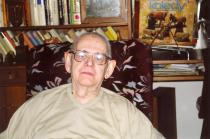Ladislav Porjes with his father Arpad Porjes
Many years after the war, a letter from some lady came to the radio station where I was working, in which she wrote that she had heard my name on the radio, and wanted to know if I'm the Lacinko who she had once nursed. She sent me a photo of me as a two-year-old little boy with my father - actually thanks to her I have my one and only reminder of my father [Arpad Porjes]. This kind lady was Ilona Balazova, who my grandparents hired as a wet nurse for me when I became an orphan. She was a single mother, whose first name was the same as my mother's - Ilona. She apparently had enough milk to go around and loved me perhaps more than her own child. Ilona had married a police sergeant somewhere near the border of Slovakia and Moravia. I set out to see her. In order to surprise her, I didn't let her know ahead of time that I was intending to visit her. When I arrived, I met her husband, this man on crutches, who told me that she had died shortly before. He at least took me to her grave.
Thanks to Ilona Balazova I have at least this photograph - I have no other remembrance of my father. My father was born in 1880 in the Central Slovakian town of Zilina. He was the oldest of eighteen siblings and was the only one in this large family to finish school. He became a lawyer. Even though I don't remember my father, I know that he was a popular lawyer, as when various people would meet me in Zilina in the company of my grandparents, they would always talk highly of him. They told me that my father had been a treasure, and stroked my head. I heard that there was quite a marked difference in how my father treated various clients. He was called the "lawyer of the poor" as he represented poor people for free, while making it up on the rich. It enabled him to give a dowry and very decently marry off eight of his thirteen sisters.
When I was not quite three years old, my father died from consequences of an amateurishly treated wound that he had gotten on the Italian front during World War I, where he had fought as a cadet for one year. Thus I became an utter orphan - together with me, however, were also 'orphaned' those of my aunts who hadn't yet gotten married. They embarked upon their last trip to the 'final solution' camp as single women. They may have been attractive, but without a dowry, even a pretty Jewish girl had a hard time finding a husband.













